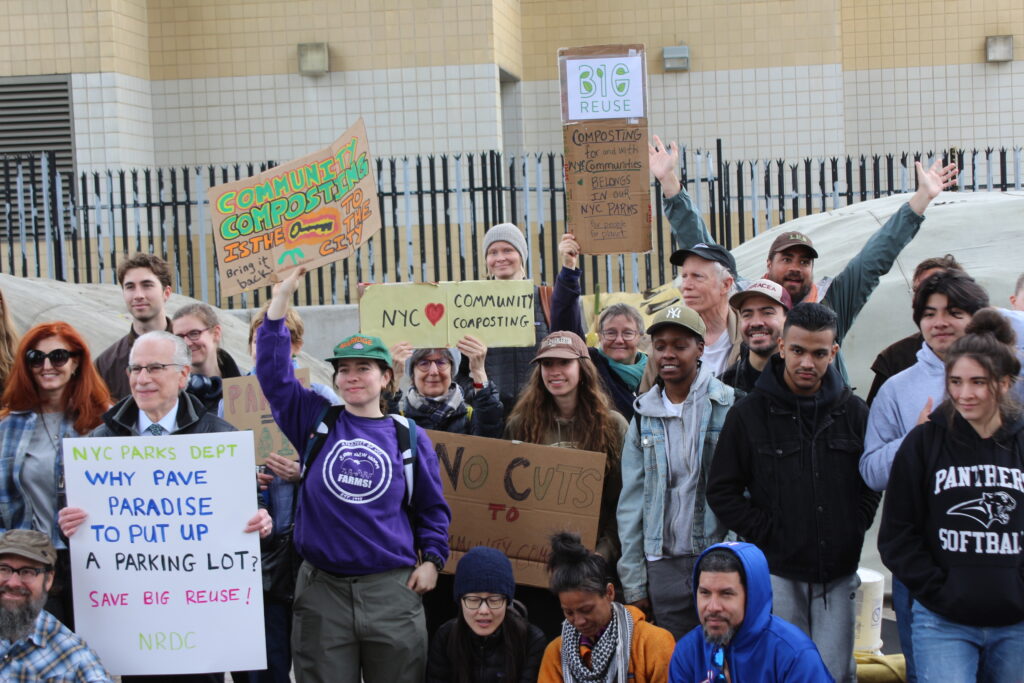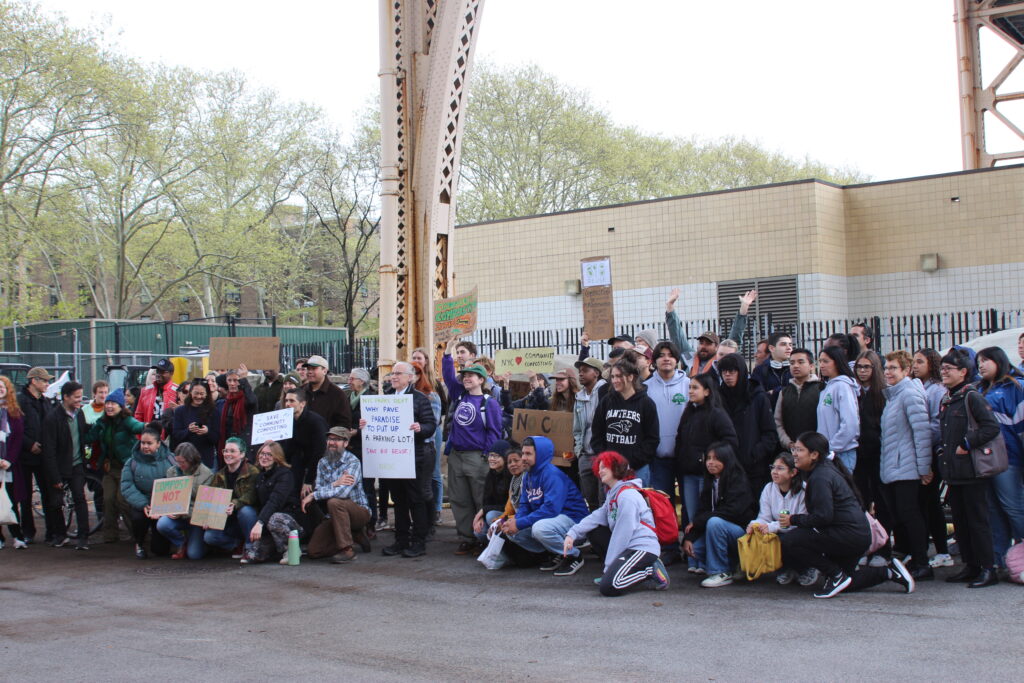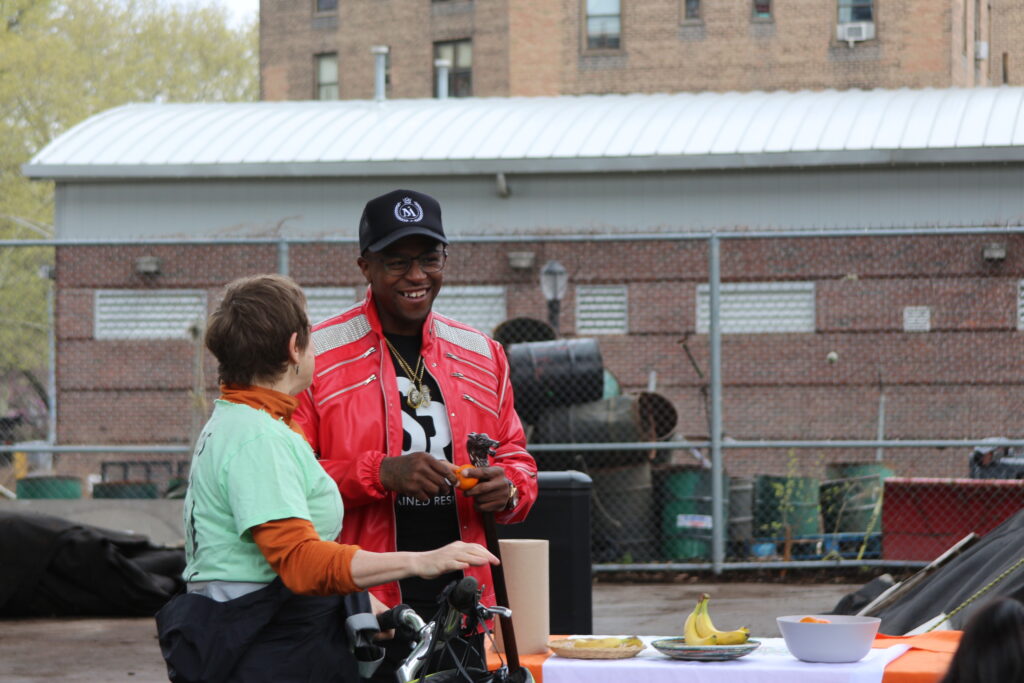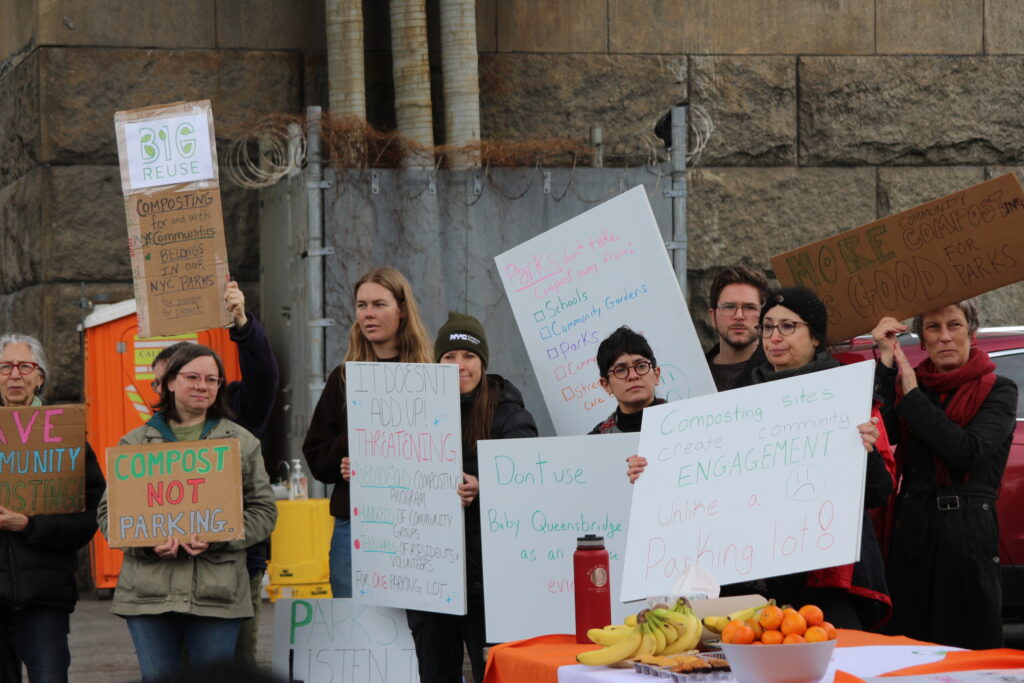By Celia Bernhardt | cbernhardt@queensledger.com

Credit: Celia Bernhardt
Elected officials, activists, and students congregated under the Queensboro bridge Friday morning to rally against the impending closure of a composting site near NYCHA’s Queensbridge Houses.
Environmental nonprofit Big Reuse has operated the large-scale community composting site on a Parks Department lease since 2017. The lot was an illegal garbage site with 40 dumpsters of demolition and construction waste from a private contractor prior to the composting project, which went on to win the title of small scale composter of the year in 2020 from the US Composting Council.
Now, Parks is looking to evict Big Reuse from the site by June 30. They plan to use it as a lot for agency parking and three large storage containers as their employees work to revamp the nearby Baby Queensbridge Park.
Big Reuse Executive Director Justine Green said the plan “makes no sense.” He argued that Parks could place storage containers in nearby existing staff parking lots.
“They have space!” Green said, motioning towards a nearby area. “When you walk and leave, you’ll see 22,000 square feet of parking that’s full of personal staff parking…They’re saying they need to kick us off so their staff can drive to work.”
In response to a request for comment, a Parks representative reiterated that Big Reuse will have access to the space through June, and said that the department will begin its construction process in the fall.
“While we support composting and recognize the important work Big Reuse does, we look forward to executing our vision for this space to enhance the neighborhood’s quality of life, including the nearby NYCHA complex,” the representative said via email.

The rally drew a crowd of students, activists, and electeds. Credit: Celia Bernhardt
Queens Council Members Julie Won and Shekar Krishnan were among the elected officials at the rally. State Assembly candidate Claire Valdez, running on the DSA ticket to represent Western Queens, also attended. Speeches over the course of the hour emphasized the positive climate impacts of composting, explaining that reducing landfill means reducing the release of methane into the atmosphere.
“Compost cools the planet by putting carbon back into the ground, continuing the cycle of life, instead of polluting our air and atmosphere, communities,” Big Reuse compost educator Gil Lopez said. “Big Reuse supports dozens of greening groups and hundreds of activities. Without a space to operate out of, all these groups and activities will lose all that support.”
It’s not the first time Big Reuse has faced down challenges from the city.
Parks threatened the compost site with eviction in 2020, citing the same reason of needing space for parking and equipment for Baby Queensbridge renovations — despite that project being in the planning stage at the time. City Council members, advocates, and Big Reuse staff and supporters rallied against the decision; Parks later reversed course and extended the organization’s stay under the bridge.
Then in November 2023, along with a slate of budget cuts, the Adams administration announced it was cutting all $3 million in funding that community composting programs had used to function. Since the cuts went into effect at the beginning of 2024, private donations have helped keep Big Reuse and its community composting partners afloat.
“We’ve kept three people on staff at the New York City Compost Project,” Lopez said, referring to a composting network the organization hosts. “We used to have 19, now we have three. So we’re able to manage this composting site at a greatly reduced capacity.”
What’s in it for Queensbridge?
Among the ralliers was Long Island City local Lashawn “Suga Ray” Marston, founder of a community organization called Transform America. A former Queensbridge resident, his family still lives in the houses.
Ray, for his part, is a big proponent of Big Reuse, and thinks the group should be able to stay put. But he thinks the Queensbridge community at large might feel ambivalent towards the composting site.
“The great majority of people in Queensbridge, I think, don’t really know what’s going on back here,” he said. “So therefore, they don’t know how important it is.”

Suga Ray speaks with a fellow activist. Credit: Celia Bernhardt
On top of that, Ray reported hearing plenty of concerns from his Queensbridge neighbors about parking. Though the planned lot would be for Parks vehicles only, Ray said he thinks some residents aren’t aware of that restriction — and even if they are, the prospect of increased competition for street spots as park renovations begin might sway them in favor of the lot.
Ray is sympathetic to those concerns. “Some people sometimes have to park far away and take an Uber,” he said. “That’s insane.”
Still, he argued that the compost is too important to go, and that Parks should find other vacant spaces in the neighborhood for their purposes. He also hopes that, if they’re able to secure enough funding, Big Reuse will be able to reach out more frequently to NYCHA residents.
“[Residents] want parking because they don’t understand the importance of compost. So we need more education, because not only does it go to feed gardens throughout the city — food, and stuff like that — but it can benefit the health of people right here in Queensbridge” he said. “If we can find a way to deepen the relationship, to educate people[…]then people will be more inclined to fight for it, as opposed to saying, ‘No, we want parking.’”
Queensbridge’s community garden, like many around the city, has benefited from community compost deliveries. When it comes to residents’ health, composting can minimize the harmful effects of lead in city soil.

Assembly candidate Claire Valdez, fourth from right, standing with fellow protesters. Credit: Celia Bernhardt
Gil Lopez, a compost educator with Big Reuse, explained that humic acids released in the composting process can bind with lead molecules, making the toxin less bioavailable in the produce grown from the garden — so when community members eat those fruits and vegetables, they’re less likely to absorb any of the lead they were grown in.
That’s important, because NYCHA residents arguably have enough lead to worry about. The majority of the city’s public housing was built before lead paint was outlawed: amid plummeting funds for maintenance and agency coverups of the true extent of the issue, families have suffered the health tolls of lead exposure in the home. Queensbridge’s proximity to the Ravenswood smoke stacks adds another layer of built-in environmental health hazards for the community.
“We need Big Reuse here,” Ray said. “But I think if we’re keeping it here, we got to do a better job of outreach and building a relationship between this organization and the residents of Queensbridge — and do tours back here for the young people and for the seniors, right? Let’s figure out how to have regular community engagement.”



